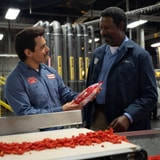
Cheetos and their dust have been around seemingly forever, and yet the story of how Flamin' Hot Cheetos rose to prominence is mysterious and contentious. While the original flavor is ubiquitous in our world, Flamin' Hot Cheetos were said to be invented by Richard Montañez — he wrote a book about it, which this movie is based on — until a later report said Richard was a gigantic liar. But a similar thing happened to "The Accidental Billionaires" and the story of Facebook/Mark Zuckerberg, and that resulted in "The Social Network," so should we complain?
"Flamin' Hot" is directed by Eva Longoria, and stars Jesse Garcia, Annie Gonzalez, Dennis Haysbert, Tony Shalhoub, Emilio Rivera, Matt Walsh and Pepe Serna. It releases on Hulu and Disney Plus on June 9, 2023. Here's what critics have to say about the movie.
The premise
Premiering at the SXSW Film Festival, "Flamin' Hot" tells the backstory of Frito-Lay's insanely popular, ultra-spicy line of snack chips — the ones that singe your taste buds and stain your fingers a radioactive red — as marketing guru Richard Montañez lays it out in his memoir, "A Boy, a Burrito, and a Cookie: From Janitor to Executive." After a rough start selling drugs and hustling on the streets of East Los Angeles, Montañez got a job cleaning the machines at Frito-Lay's Rancho Cucamonga plant and worked his way up to head of Multicultural marketing. Along the way, he may or may not have invented the recipe for Flamin' Hot Cheetos, Doritos, et al.
Not everything may be totally true
After seeing the film, I diligently began to do some research, quickly discovering that "Flamin' Hot" may not quite be the true story it purports to be. I promptly stopped digging any further, not wanting to learn any troublesome reality that could diminish my appreciation. After all, as we learned from another terrific movie, when the legend becomes fact, print the legend.
It's an inspiring story that Montañez told for years — he even wrote a book about it — and which has now gotten the biopic treatment, care of the aptly titled "Flamin' Hot." But any biopic engenders scrutiny and in May 2021, the Los Angeles Times published an expose about how Montañez didn't actually do the one thing he's long said he did. Throughout Longoria's film, written by Linda Yvette Chávez and Lewis Colick, Montañez's Flamin' Hot origin story is told, along with a slew of other lightly buffed-over truths. It’s entertaining enough, but this is a story that doesn’t feel real, mostly because it isn’t.
The truth, per the LA Times, was that "Flamin' Hots" were created by a team of hotshot snack food professionals." But why let the truth get in the way of a good story? Plenty of biopics bend facts or exaggerate, for better or worse, to sell their message about the meaning of a celebrity's life. So, why not Montañez's? The problem with "Flamin' Hot" is less that it's a feel-good fiction, and more that the filmmakers don't embrace that freedom to tell a more challenging narrative. Instead, this success story treats systemic issues as mere hurdles that can be bested with enough charm and grit.
The actors are literally and figuratively hot
The film channels the sentimental spirit of a telenovela to depict the Montañez household's everyday life saturated with mundane joys — even at times when they have trouble putting food on the table. Ricky's wife Judy, played by the delightful and mercurial Annie Gonzalez, is a force to be reckoned with — either cheering him up when he wallows, or becoming the voice of reason when he waivers. Longoria makes sure to foreground Judy as Ricky's equal in their invention of Flamin' Hot Cheetos — giving Gonzalez a meaty role to showcase her dramatic range.
It's hard to find movies with married couples that feel authentic, and harder still to find Hispanic actors playing those couples. They're out there, but the relationship between Judy and Richard feels so lovey and rooted in reality. Judy is the ultimate superhero in this movie. She's the one who gets Richard on track, goads him when he needs it, supports him tirelessly and is one amazing mom to their boys. The give and take in the relationship is beautiful to watch.
Eva Longoria's directorial debut has some faults
The problem here isn't the subject matter as much as the execution. This film has SO many speeches about the cultural importance of what's happening that I half expected to see a flashing "Applause" sign in the corner of the screen after a while. The audience at SXSW did applaud roughly 25 times, so this is a crowd-pleaser that pleases. But it's depressingly unambitious, too content to skim the surface of its characters and story in a manipulative and even dishonest manner. It's too superficial to pack any heat at all.
The flavor might have been better balanced, the earned payoff more sweet, had the movie's real villain been revealed not as Richard's hard-knocks early years or some rude managers or imposter syndrome — all formidable opponents — but rather the highly-profitable real-world systems strategically designed to keep Richard down. Frito Lay is not a recipe for egalitarianism, but the corny version is a lot more palatable, I guess.
A visual feast for the eyes
Along the way, the film immerses you visually with bright colors and retro production and costume design, and auditorily with Spanish slang and catchy music of the era. It goes the extra mile to make the audience feel like Montañez throughout the movie, from when he's first introduced to the expansive and daunting Frito-Lay factory, to when he first decides to call upon his faith in one of his many times of need, pulling us into his emotional core.
TL;DR
While "Flamin' Hot's" choice of subject might separate it slightly from the larger canon of great-man biographies, it's otherwise a very familiar recipe coated with a little new seasoning.
One might say that "Flamin' Hot" is just another serving of cinematic junk food: corn chips sprinkled liberally with the moviemaking equivalent of maltodextrin.
Whether or not the legend of a janitor inventing the spicy snack is true (and it probably isn't), the film treatment definitely doesn’t satisfy.
Eva Longoria's film is simply a 99-minute commercial for the Frito-Lay corporation.
